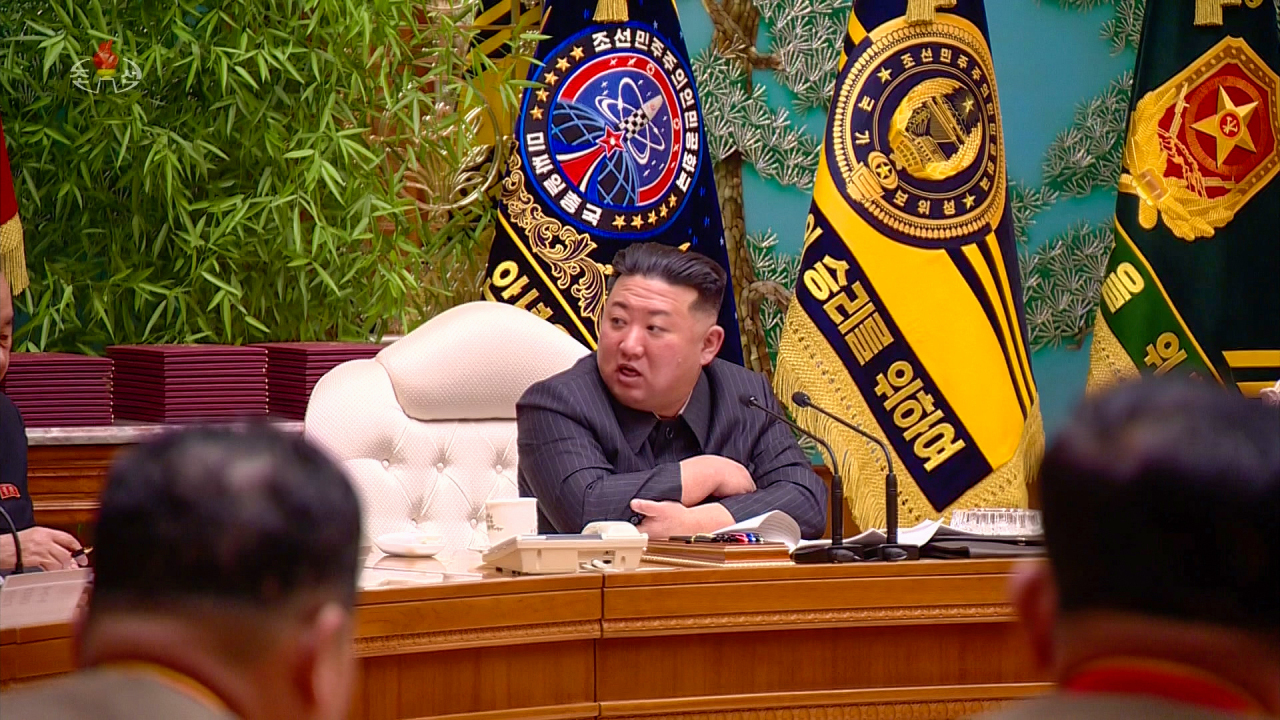 |
North Korea`s state-run Korean Central Television on Tuesday airs video footage of North Korean leader Kim Jong-un presiding over an enlarged meeting of the party`s Central Military Commission at the headquarters of the party`s Central Committee in Pyongyang on Monday. In the video, Kim is seen sitting in front of the flag of the Missile General Bureau. |
North Korean state media on Tuesday released photos and a video showing the flag of the “Missile General Bureau” featuring the Hwasong-17 intercontinental ballistic missile flying over Earth against the background of the symbol of an atomic nucleus.
The flag was one of more than 20 flags that encircled the venue of the enlarged meeting of the Central Military Commission of the Workers’ Party of Korea held Monday at the headquarters of the Party Central Committee in Pyongyang.
The upper part of the flag shows the number “016.” The number suggests the possibility that the Missile General Bureau could have been founded in 2016 when North Korea conducted two nuclear tests and launched the Kwangmyongsong-4 long-range rocket.
South Korea’s Unification Ministry on Tuesday confirmed that the state media reports mark the first time that North Korea has officialized the establishment of the Missile General Bureau, albeit in a somewhat surreptitious manner.
In a nutshell, Seoul-based experts shared the view that the Missile General Bureau handles missile development, planning and production, defense procurement and other miscellaneous administration as well as provides logistics support.
“Pyongyang also intends to reveal that the country has a working-level, administrative organ committed to developing and producing missiles capable of carrying strategic and tactical nuclear weapons, given that the icon of the missile was seen lying above the atomic nucleus symbol in the flag,” Hong Min, director of the North Korean Research Division at the government-funded Korea Institute for National Unification, told The Korea Herald.
“North Korea also seeks to show off that the country has formally institutionalized missile program by intentionally disclosing the flag.”
Echoing the view, Park Won-gon, a professor in the department of North Korean studies at Ewha Womans University, also took note that the establishment of the Missile General Bureau shows North Korea’s intent to perpetuate the development of nuclear-capable missiles.
“The presence of the missile general bureau suggests that North Korea has institutionalized multistage procedures for missile development, including development planning and defense procurement. The institutionalization means North Korea will carry on,” Park told The Korea Herald.
“Therefore, the belated officialization of the bureau shows North Korea’s clear intention to reaffirm its resolve to continue to develop and advance missile and nuclear capabilities and South Korea and the international community.”
North Korea’s disclosure of the bureau also came a day before North Korea is set to mark the 75th Feb. 8 anniversary of the founding of its Korean People's Army with a possible large-scale military parade.
Hong said the bureau will be part of the “three-axis missile system” with the ruling party and the North Korean military. The Munitions Industry Department under the auspices of the ruling party or the party leadership would supervise missile development and production. The military would be responsible for launching, deploying and operating missiles.
Hong explained that the predecessor of the bureau is likely to be the US-sanctioned Ministry of Rocket Industry, also dubbed by the US government as the Rocket Industry Department, which is subordinate to North Korea’s Munitions Industry Department.
Hong raised the possibility of the Ministry of Rocket Industry changing its name to the Missile General Bureau, given that North Korea established the ministry in 2016 by expanding and reshuffling a general bureau that had handled missile development programs under the Second Economic Committee.
Yang Uk, a research fellow at the Asan Institute for Policy Studies think tank, pointed out that North Korea followed the case of the Russian Armed Forces, which operates the Main Missile and Artillery Directorate, or GRAU, responsible for defense procurement, weapons development, production, storage and maintenance. The Soviet Union also ran the Main Artillery Directorate for the same purposes.
“The concept of the missile general bureau stems from the Russian Armed Forces and the Soviet Armed Forces. The communist army has been continuing state-led weapons development, production, and maintenance through a general bureau,” Yang told The Korea Herald. “Therefore, North Korea’s establishment of the Missile General Bureau is not an unusual step, given that missile development has been state-led.”
During the meeting of the Central Military Commission, North Korean military leaders on Monday also had an in-depth discussion on “major military-political tasks for 2023 and directions of military construction,” the state-run Korean Central News Agency reported Tuesday.
North Korean military leadership concurred to “constantly expand and intensify the training exercises of the Korean People’s Army for combat and military operations in response to prevailing circumstances and to further rigorously war readiness posture.”
The meeting also covered “practical tasks to bring about a major shift in military-political works” and adopted decisions to achieve the proposed objectives, the KCNA said.




![[Exclusive] Hyundai Mobis eyes closer ties with BYD](http://res.heraldm.com/phpwas/restmb_idxmake.php?idx=644&simg=/content/image/2024/11/25/20241125050044_0.jpg)
![[Herald Review] 'Gangnam B-Side' combines social realism with masterful suspense, performance](http://res.heraldm.com/phpwas/restmb_idxmake.php?idx=644&simg=/content/image/2024/11/25/20241125050072_0.jpg)

